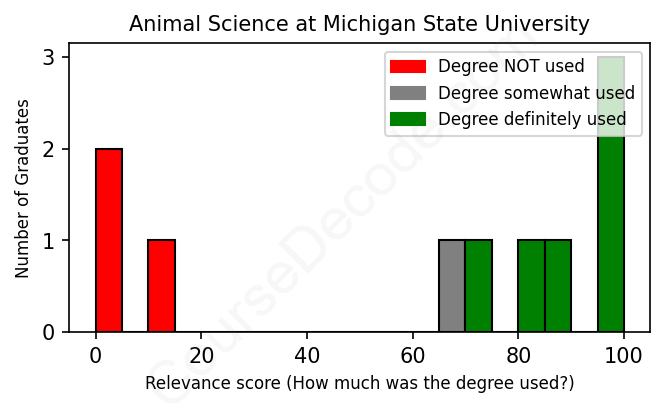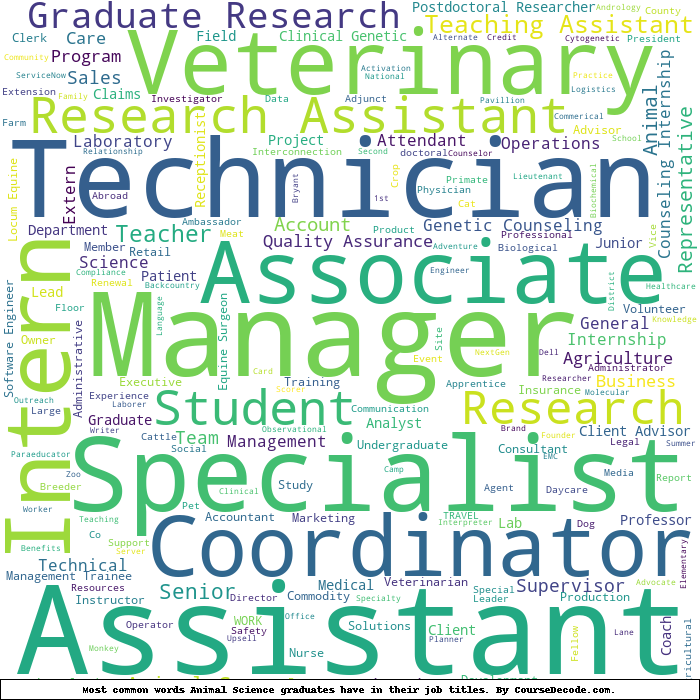
First, some facts. Of the Animal Science graduates from Michigan State University we've analyzed , here's how many have used (or NOT used) their degree in their career:

These are estimates based on AI analysis of 10 LinkedIn profiles (see below).
The verdict? Slightly below average. Overall, with an average relevance score of 62%, Animal Science graduates from Michigan State University have a slightly lower likelihood (-5%) of finding work in this field compared to the average graduate across all fields:
And for comparison, here's the chart for all profiles we've looked at across all degrees.
Also, after graduating, 40% of these graduates have pursued further education other than another Bachelor's degree (such as a Masters degree or other), compared to the average across all profiles of 35%. This suggests you may need more than just a Bachelors degree to be competitive as a Animal Science graduate.
See the details:
|
Relevance score: 0% We think this person has NOT gone into a career related to their degree. We think this person has NOT gone into a career related to their degree.
DEGREE INFOGraduated in 2019 from Michigan State University with a Bachelor of Science - BS in Animal Science. No other secondary education since. JOB HISTORY SINCE GRADUATIONLegal Assistant Knappmann Law PLC Jan 2020 - Present ABOUTNo information provided. |
The top 10 most common jobs done by the graduates we've analyzed (ranked most common to least) are:
From analyzing the job paths of graduates from Michigan State University with a degree in Animal Science, it seems that many of them found work directly related to their studies, especially in roles tied to animal care and veterinary practices. For instance, several graduates became Veterinary Technicians, Animal Care Technicians, and Veterinary Assistants, all of which directly apply the skills and knowledge gained during their degree. These positions allow them to engage with animals daily and use their understanding of animal behavior, health, and welfare, proving to be highly relevant to their academic background in Animal Science.
However, it's also clear that not all graduates stuck to jobs closely aligned with animal science. For example, some went on to work in retail, customer service, or even legal assistant roles where the connection to their degree is pretty much nonexistent. While some of these jobs may require soft skills or general communication abilities that could be beneficial, they don’t utilize the specific animal science knowledge that these individuals spent years acquiring. Overall, graduates who pursued careers directly related to animal science seem to have better aligned their jobs with their education, but a noticeable number have ventured into unrelated fields, which may lead them to use a more generalized skill set instead.
Here is a visual representation of the most common words in job titles for Animal Science graduates (this is across all Animal Science graduates we've analyzed, not just those who went to Michigan State University):

Looking at the career trajectories of Michigan State University graduates who majored in Animal Science, it appears that many have started their careers in positions closely related to animal care and veterinary services right after graduation. For instance, several graduates landed roles like veterinary technicians or animal care technicians soon after completing their degree, which is a solid first job aligning with their field of study. Others took on roles in research or veterinary assistance, particularly in laboratory settings or emergency care. However, the pathway isn't always straightforward; some have veered off into unrelated fields, such as customer service or legal assistant roles, indicating that not every graduate remains in animal science-related careers.
As we look further down the line—about five or ten years after graduation—the trends become a bit mixed. Graduates who began their careers in more specialized roles, like research or pharmacology, seem to have advanced their careers positively, moving into associate scientist positions or higher-level research roles. Meanwhile, others have remained in animal care, which shows a commitment to this path. However, we can see that some graduates also moved into seemingly unrelated jobs, suggesting a lack of opportunities in the animal science sector or a shift in career interests. Overall, while many individuals have built successful careers within animal science or related areas, a noticeable number have branched out into different fields, indicating a varied landscape for graduates from this program.
Honestly, a Bachelor’s degree in Animal Science can be a bit of a mixed bag, and it varies depending on how well you handle science and math subjects. At Michigan State University, known for its strong programs in agriculture and animal sciences, you might find it more challenging than average. You’ll be diving into courses like animal physiology, genetics, and nutrition, which require some solid math and biology skills. If you’re super passionate about animals and science, you might find it fun and engaging, but if that’s not really your thing, it could feel pretty tough at times. Overall, it’s a respectable challenge – not the easiest degree out there, but if you’re dedicated, it’s definitely doable!
Most commonly, in the LinkedIn profiles we've looked at, it takes people 4 years to finish a Bachelor degree in Animal Science.
Looking at the jobs of these Michigan State University Animal Science grads, it seems like their financial situations vary quite a bit. The first graduate from 2011 worked mainly as a veterinary technician, which typically isn't the highest-paying field, especially early on. The 2012 grad is working at Kohl's, which isn’t exactly a goldmine either. However, the 2013 grad slowly moved up from an Animal Care Technician to an Associate Scientist, which usually comes with a nicer paycheck, and the trend continues with other later graduates landing roles that likely pay better, especially those in specialized or research-related jobs. The 2020 grad seems to be stacking up a ton of internships in genetic counseling, which could lead to a lucrative career down the line. Overall, some are likely doing alright, while others might still be working their way up the financial ladder.
Here is a visual representation of the most common words seen in the "about" section of LinkedIn profiles who have a Bachelor degree in Animal Science (this is across all Animal Science graduates we've analyzed, not just those who went to Michigan State University). This may or may not be useful:

Here are all colleges offering a Bachelor degree in Animal Science (ordered by the average relevance score of their Animal Science graduates, best to worst) where we have analyzed at least 10 of their graduates:
| College | Score | Count |
|---|---|---|
 Michigan State University Michigan State University
|
62 | 10 |